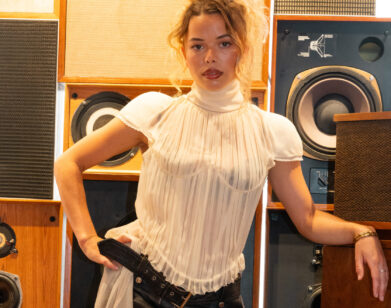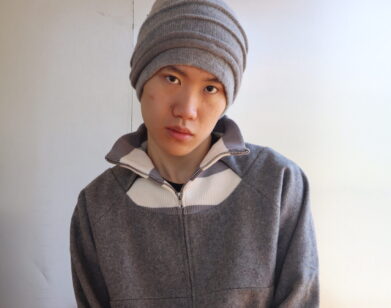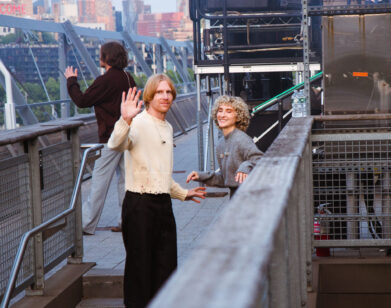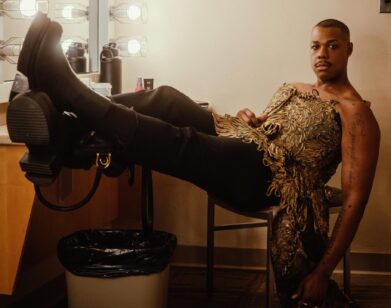Alexander Spit Takes It On the Otherside
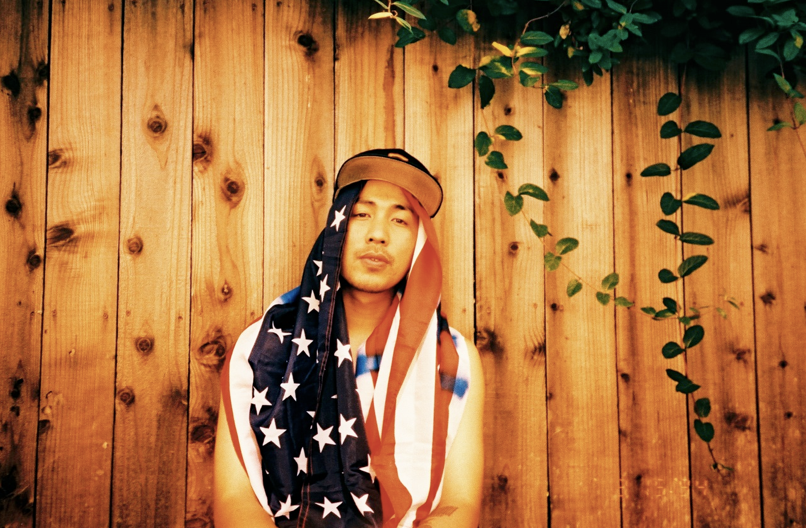
ABOVE: ALEXANDER SPIT. IMAGE COURTESY OF BRICK STOWELL
Peep my body, every scar got a story / peep my catalog, my bars got that glory / I’m in a spot where every dog got a shawty / I see through these snakes and every Kurt has got a Courtney / I got the troubled mind and I got a lot to say / My check is big, and my connect is just a block away.
These are the opening lines of the title track off Alexander Spit’s (né Alexander Manzano) forthcoming album, A Breathtaking Trip To That Otherside, out tomorrow on Decon. While the record may be sprawling in sound and length, these initial rhymes make it pretty clear what’s on Spit’s mind: the past, pop culture, babes, drugs, and not-so-humblebrags.
Perhaps most prominent among these concerns is the drugs, which figure heavily into Spit’s musings about all the others. Themention of any number of smokeables and edibles is nothing unusual in the rap scene; what is unexpected, however, is Spit’s audio translation of this lyrical haze. Produced by the rapper himself, the album makes ample use of distortions, reverbs, samples, and one woman’s particularly unsettling laugh. These audio effects, combined with Spit’s introspective lyrics, alter the listener’s consciousness as much—or at least almost as much—as Spit’s own.
Featuring contributions from Action Bronson, Bago, The Alchemist, and E-40, among others, A Breathtaking Trip… is just that. Recently, we spoke with the LA-based up-and-comer about recording, road trip albums, and what’s next.
ERIN BRADY: Are you actually on mushrooms in your video for “A Breathtaking Trip…?”
ALEXANDER SPIT: Yeah. That was my 25th birthday. It’s pretty hard to put a viewer in my shoes for that entire day.
BRADY: Could you tell us a little about the process of shooting the video?
SPIT: I’d never produced a music video before, and I pretty much waited until the last day to get all of the stuff. You’d be surprised by how hard it is to find some props in Los Angeles. Long story short, I didn’t get any sleep the night before. And the night before that, I’d celebrated my birthday in LA due to the fact that I knew I wasn’t going to be in Los Angeles for my birthday. So, I was already hungover, and I didn’t get any sleep the night before. That first shot on Skid Row is at like five in the morning. We had to meet up at like 3:30 to set up for that shot. Then we drove out to the 120Ë?F desert with a huge bag of mushrooms.
When I first met Jason Goldwatch [the video’s director and the owner of Decon], his vision—even before choosing that song—was, “Sometime let’s go to the desert, take a bunch of mushrooms, and film a bunch of stuff.” And that’s pretty much how it went down. We had a semi-treatment for the video, but none of it got followed at all. I was on another level for that entire day.
BRADY: I applaud you for being a high functioning mushroom eater.
SPIT: [laughs]
BRADY: I get the feeling this album was a labor of love, how long did it take to record?
SPIT: My process with starting a new project and whatnot is I begin around a title. Usually, based off of just a title, I’m able to put together themes and concepts from there. I’ve always admired Hunter S. Thompson’s titles for his books. They’re always wordy and pretty elaborate. I wanted to try to do a title on that tip. Around March is when I came up with [“A Breathtaking Trip To That Otherside”], and then from there I just started recording a bunch of stuff. I finished it around August or September-ish.
BRADY: Was it difficult to be your own producer and taskmaster?
SPIT: Over the years, it’s become something that I take a lot of pride in. It is very difficult and I sometimes overlook how many duties I take on. At this point, I kind of wouldn’t have it any other way.
I started making hip-hop music when I was 11, and pretty much since then I’ve just been honing that craft, the craft of arranging a song and producing a beat. It’s a task-heavy role, but at this point I really enjoy it and it allows me to convey exactly what I’m trying to get across in a song.
BRADY: When you were 11, how did you record beats?
SPIT: It literally started with a tape recorder. There were a few websites at the time that me and my buddies would hit up for free instrumentals. Or we’d go to Tower Records and there’d be a CD singles section where singles were like a dollar. So we would put on a CD or play an instrumental off of the computer, put the recorder next to it and just freestyle over it.
BRADY: Do you have a favorite sample right now?
SPIT: I like textures and tones right now. Sometimes, it will be a melodic feedback from a song or something. I like warm, ethereal sounds. That kind of gets covered in every genre of music, so it could be a rock sample, jazz, soul, reggae…
BRADY: What are some of the influences you can pick out of this album?
SPIT: Hip-hop music in general kind of revolves around singles, and I appreciate that mindset, but at the same time, I wanted to go beyond that. It’s not like I was intending to make a classic record—I mean, I’m always trying to make timeless music, but I really just tried to reference the music that on a road trip you can put in and not have to skip a track. Honestly, I was listening to a lot of Outkast. Aquemini. It’s one of those albums that I can always put on. I can press play and just let it be. I could say the same about Jay-Z’s The Blueprint. What else? I’ve always referenced Portishead’s music in my production in regards to warm, dark melodies.
BRADY: Who are your dream collaborators?
SPIT: Man. The list is pretty long. I would love to do a song with Portishead. I’d love to do a song with Kanye and Jay-Z. I’d love to do a song with Andre 3000. I’d love, love to do a song with—this is going to seem random, but I’d love to do a song with Tom Waits.
BRADY: That’s unexpected. Why Tom Waits?
SPIT: Around when I was like 17 or 18, my buddy, D-Money, put me on the Tom Waits and I literally at that point got every one of his albums and kind of studied his music. I like that he provides an entire world for the listener. He’s hopefully someone that I could vibe with down the line. I’m not sure how it would sound or even how it could work, but he’s always been a huge influence.
BRADY: Tom Waits’ music is very lyrically driven. Can you tell us a little about your own writing?
SPIT: I really don’t try to force the creative process. I’m really jealous of those other rappers who just hear a beat and write a song within minutes. I know a lot of rappers like that. I’m the type of artist who kind of has to sit with some stuff for a while.
I’m not usually rapping about clubs. I’m usually rapping about fucked-up relationships I have with either loved ones or people I meet in the industry or, just like, the fucked-up relationship I have with myself—trying to be a normal human being, but at the same time strive for greatness.
BRADY: Both the record and the video are pretty trippy, any plans to try to translate this to live shows?
SPIT: Over the last year or two that’s been one of my main priorities and goals. It’s really hard to translate—especially within hip-hop music. Hip-hop music, in my opinion, is still very closed-minded, and if you’re trying to do something that’s too different, you get categorized as trying to do some kind of “alternative hipster” thing.
BRADY: How would you describe your music?
SPIT: I really try to keep it hip-hop oriented. For me, that’s high energy—people being able to dance, being able to vibe out—but with an ethereal factor. When I perform, I’ll have a guy doing live visuals for me or I’ll have a guitarist playing a lot of solo, really heavy reverbed vibes and stuff like that.
BRADY: Where do you see yourself in 2013?
SPIT: I don’t think there are any breaks coming up.
A BREATHTAKING TRIP TO THAT OTHERSIDE IS OUT TOMORROW. FOR MORE ON ALEXANDER SPIT, VISIT HIS WEBSITE.

